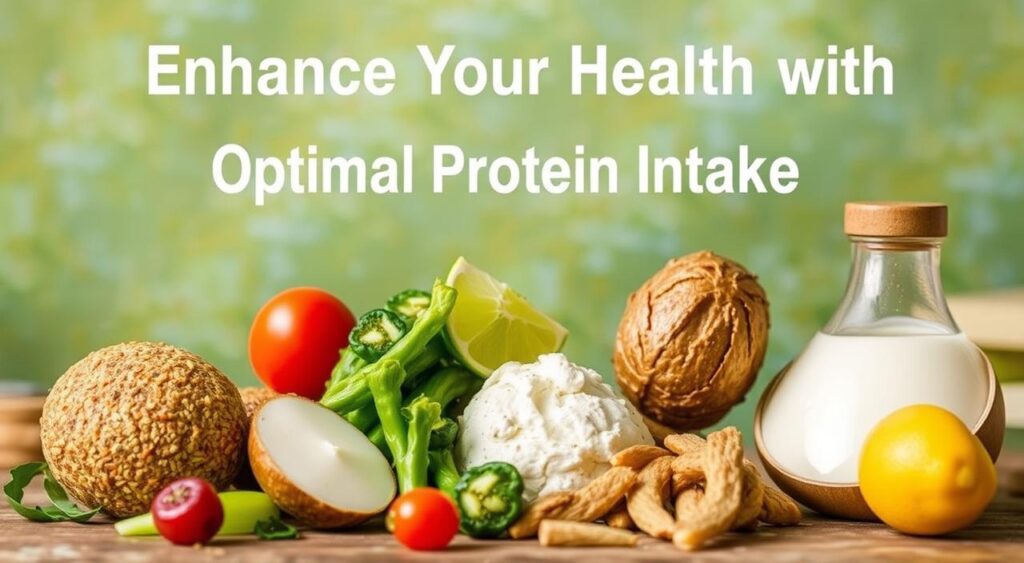Boost Your Health with the Right Protein Intake. Adequate protein intake is key for good health. A recent study shows it can lower the risk of chronic diseases. The Dietary Guidelines for Americans 2020–2025 say adult women need at least 46 grams of protein a day. Men should aim for 56 grams. Getting enough protein can help prevent type 2 diabetes and heart disease.
Boost Your Health with the Right Protein Intake
Eating enough protein is good for your health. It’s a must-have in a balanced diet. Knowing how important protein is can help you stay healthy. Boost Your Health with the Right Protein Intake.
Key Takeaways
- Adequate protein intake is essential for overall health.
- Adult females should consume at least 46 grams of protein daily.
- Adult males should aim for at least 56 grams of protein daily.
- A high protein diet may help lower the risk of chronic diseases.
- Meeting protein intake requirements can have a significant impact on overall health.
- A balanced diet with adequate protein can help mitigate the risk of various health conditions.
What Is Protein and Why Your Body Needs It
Protein is a key nutrient for our health. It’s one of the three main nutrients, along with fats and carbs. It helps build and repair our cells, organs, and tissues. Boost Your Health with the Right Protein Intake.
The Structure and Function of Protein
Protein is made of amino acids linked together. These chains fold into shapes that determine their function. Proteins do many things, like helping with chemical reactions and DNA replication.
The shape of a protein is very important. It decides how well the protein works. For example, enzymes need a specific shape to help with chemical reactions. Boost Your Health with the Right Protein Intake.
Essential and Non-Essential Amino Acids
There are 20 amino acids our bodies use. Nine of these are essential, meaning we can’t make them ourselves. We must get them from food. The other 11 can be made by our bodies.
Essential amino acids are vital for muscle growth and repair. They include histidine, isoleucine, leucine, lysine, methionine, phenylalanine, threonine, tryptophan, and valine. Boost Your Health with the Right Protein Intake.
How Protein Synthesis Works in the Body
Protein synthesis is how our bodies make proteins from amino acids. It involves translating mRNA into amino acid sequences. These sequences then fold into proteins that do specific jobs. Boost Your Health with the Right Protein Intake.
The process of making proteins is complex. It includes transcription, translation, and changes after translation. It’s crucial for our health. Boost Your Health with the Right Protein Intake.
The Health Benefits of Protein
Protein is good for many health areas. It helps with muscle growth, repair, and supports the immune system.
Muscle Growth and Repair
Protein is key for muscle building and repair. It gives muscles the amino acids they need. Adequate protein intake is crucial for those who work out or do resistance training. Boost Your Health with the Right Protein Intake.
Weight Management and Metabolic Health
Protein can help you feel full longer, aiding in weight control. It also boosts metabolism and improves metabolic health. Research has shown that eating more protein can lead to weight loss and better body shape.
Immune System Support
Protein is essential for a strong immune system. It helps make antibodies and immune cells. Getting enough protein can lower the chance of getting sick. Boost Your Health with the Right Protein Intake.
Hormone Production and Enzyme Function
Protein is needed for hormone and enzyme production. For example, it’s needed for insulin, which controls blood sugar. Here’s a table showing how protein helps with hormone and enzyme functions:
| Hormone/Enzyme | Function |
|---|---|
| Insulin | Regulates blood sugar levels |
| Growth Hormone | Regulates growth and development |
| Digestive Enzymes | Facilitates protein digestion and absorption |
In summary, getting enough protein is vital for health. It has many benefits and is crucial for our bodies to function well. Boost Your Health with the Right Protein Intake.
Determining Your Optimal Protein Intake Requirements
Protein needs change based on age, lifestyle, and what you like to eat. Knowing these factors helps figure out how much protein you should have. Boost Your Health with the Right Protein Intake.
Standard Protein Recommendations for Indians
How much protein Indians need daily depends on age and how active they are. For those who don’t move much, the RDA is about 0.8 grams per kilogram of body weight. But, if you’re more active or want to build muscle, you might need more. Boost Your Health with the Right Protein Intake.

Adjusting Intake Based on Lifestyle Factors
Things like age, how active you are, and your health affect how much protein you need.
For Athletes and Active Individuals
People who exercise a lot need more protein to help their muscles grow and heal. They should aim for 1.2 to 1.6 grams of protein per kilogram of body weight, depending on their workout schedule.
During Pregnancy and Lactation
Women who are pregnant or breastfeeding need more protein. This is to help the baby grow and to make milk. They should aim for about 1.1 grams of protein per kilogram of body weight.
For Vegetarians and Vegans in India
Vegetarians and vegans can get enough protein from plants like beans, lentils, and legumes. It’s important for them to keep track of their protein intake to meet their daily needs. Boost Your Health with the Right Protein Intake.
Signs of Inadequate Protein Consumption
Not getting enough protein can cause health problems like muscle loss, tiredness, and a weak immune system. Some signs include:
- Muscle loss or weakness
- Fatigue or lethargy
- Poor wound healing
- Hair loss or brittle hair
If you notice any of these symptoms, it might be time to check if you’re getting enough protein.
Protein-Rich Foods in the Indian Diet
Protein is key for our bodies, and Indian food offers many tasty, protein-rich options. The wide variety in Indian cuisine meets both meat and plant-based diets. Boost Your Health with the Right Protein Intake.
Animal-Based Protein Sources
For those who eat animal products, there are many high-protein foods in the Indian diet.
Dairy Products: Paneer, Curd, and Milk
Dairy is a great source of protein. Paneer, a cheese, is very high in protein and used in many dishes. Curd and milk are also rich in protein and are common in Indian homes. Boost Your Health with the Right Protein Intake.
Eggs, Fish, and Poultry Options
Eggs, fish, and poultry are also popular in India. Eggs are a complete protein because they have all nine essential amino acids. Fish and poultry, like chicken and turkey, are also good protein sources and can be cooked in many ways. Boost Your Health with the Right Protein Intake.
Plant-Based Protein Sources
Vegetarians and vegans have many plant-based protein options in the Indian diet.
Lentils, Pulses, and Legumes (Dal Varieties)
Lentils, pulses, and legumes, known as dal, are key in Indian food. They are high in protein, fiber, and other nutrients. Different types of dal, like chana dal and moong dal, are enjoyed across India.
Nuts, Seeds, and Traditional Indian Protein Foods
Nuts and seeds, such as almonds and chia seeds, are also protein-rich. Traditional foods like chicknuts and certain millets are also good sources of protein.
Protein Digestion and Absorption Considerations
How well we digest and absorb protein depends on the type of protein and our digestive health. Mixing different protein sources can help with better digestion and absorption.
| Protein Source | Protein Content per 100g | Common Preparations |
|---|---|---|
| Paneer | 18g | Palak Paneer, Paneer Tikka |
| Lentils (Dal) | 9g | Dal Fry, Dal Makhani |
| Eggs | 13g | Omelette, Boiled Eggs |
| Chicken Breast | 31g | Chicken Tikka, Grilled Chicken |
Protein Supplements: Navigating the Options in India
Protein supplements are key for many Indians’ fitness plans. But, with so many choices, it’s hard to know what to pick. Knowing the different types, who they help, and how to find good products is crucial.
Types of Protein Supplements Available
India offers many protein supplements, like whey, soy, egg, and pea protein. Whey protein is very popular. It’s great for building muscle and recovering from workouts. Whey protein is best for those who work out a lot.
Soy and pea proteins are good for vegetarians and vegans. They offer plant-based options that still have all the amino acids you need. Think about what you eat and what your body needs when picking a protein supplement.
Who Should Consider Supplementation
Many people can benefit from protein supplements. This includes athletes, bodybuilders, and those needing more protein for health reasons. Vegetarians and vegans also might need supplements to get enough protein.
How to Select Quality Products in the Indian Market
When choosing a protein supplement in India, look for certifications from groups like the International Society for Sports Nutrition (ISSN) or Informed-Choice. Make sure the label shows the protein content and doesn’t have too much sugar or other unwanted ingredients. Avoid products with too-good-to-be-true claims or unclear labels.
| Protein Type | Bioavailability | Recommended For |
|---|---|---|
| Whey Protein | High | Athletes, Bodybuilders |
| Soy Protein | Medium | Vegetarians, Vegans |
| Pea Protein | Medium | Vegetarians, Vegans |
Combining Supplements with Whole Food Protein
Protein supplements are handy, but don’t forget whole foods are the best source of protein. Mixing supplements with whole foods helps meet your protein needs and supports your health and fitness goals.
Always talk to a doctor or dietitian before adding supplements to your diet. This is especially true if you have health issues or concerns.
Conclusion: Creating a Balanced Protein Plan for Optimal Health
A well-planned protein intake is key for optimal health. It offers many benefits, like weight management and improved muscle mass.
To get these benefits, figuring out your protein needs is crucial. This depends on your lifestyle, age, and health goals. Talking to a healthcare professional or registered dietitian can help. They can create a nutrition plan just for you.
Adding the right amount of protein-rich foods and supplements to your diet boosts your health. A balanced protein plan unlocks the full benefits of protein. This helps you achieve a healthier body.












